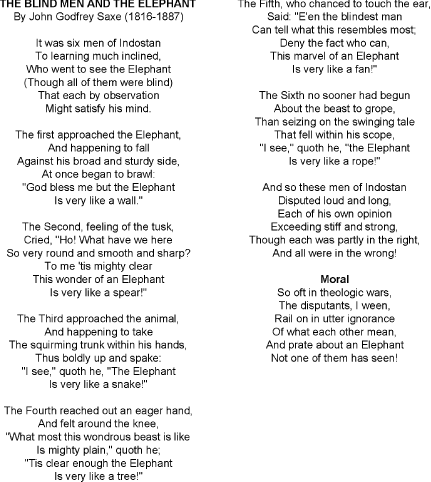Many Good Ways
In their fascinating book Strategy Safari, Henry Mintzberg, Bruce Ahlstrand, and Joseph Lampel approach the subject of business strategy in a manner we as information architects would do well to emulate. The book begins with the fable of The Blind Men and the Elephant (Figure 18-5), which they note is often referred to but seldom known. We decided to follow their lead.

Figure 18-5. The Blind Men and the Elephant
The authors of Strategy Safari proclaim, “We are the blind people and strategy formation is our elephant. Since no one has had the vision to see the entire beast, everyone has grabbed hold of some part or other and `railed on in utter ignorance’ about the rest.” Swap “strategy formation” with “information architecture” and you’ve just described many of the heated debates at our conferences and on our discussion lists.
Strategy Safari extends the philosophy of “many good ways” by describing ten schools of thought within the business strategy field:
|
The school |
Strategy formation as: |
|---|---|
|
The Design School |
a process of conception |
|
The Planning School |
a formal process |
|
The Positioning School |
an analytical process |
|
The Entrepreneurial School |
a visionary process |
|
The Cognitive School |
a mental process |
|
The Learning School |
an emergent process |
|
The Power School |
a process of negotiation |
|
The Cultural School |
a collective process |
|
The Environmental School ... |
Get Information Architecture for the World Wide Web, Second Edition now with the O’Reilly learning platform.
O’Reilly members experience books, live events, courses curated by job role, and more from O’Reilly and nearly 200 top publishers.

